|
| |
'From the time we met, I spoke to Lindsay at least once a week. If I had a difficult part, he'd read it and give me notes. In fact, on A Clockwork Orange he gave me the key to the role. In a very simple way he helped me enormously. He told me to play Alex like a close-up I did in If.... when I smiled defiantly at the head boy as he was about to cane me. He said, "There's a close-up of you just looking at me and smiling. That's the way you play A Clockwork Orange." I never mentioned this to Kubrick…' |
| |
Actor Malcolm McDowell on his friend Lindsay Anderson* |
When I first saw Britannia Hospital at the still impressionable age of 21, I was struck by how politically naïve I was. Yes, I was a union man who’d experienced life on the picket line in a rather exciting eight day period and it’s a sign of that naiveté that while I can’t remember what we were striking for (the usual suspects, I suspect), I do remember the cricket games we improvised on empty streets at four in the morning. My knee-jerk liberalism was roundly dismissed by those at both ends of the political spectrum. Rightly so, neither fish nor fowl. As I grew up, the trade unions - with some help from biased and right-wing, fawning media - managed to take on the character of immovable obstinacy, something easily mocked and parodied. It was only during the miner’s strike of 1984/5 did I develop a stronger recognition of eyes-wide-open injustice and saw the Prime Minister as not only divisive but truly dangerous to a sane and stable, compassionate and inclusive society. She commanded zero respect from my point of view and even hearing the cadence of her voice would set my nerves jangling, so much the product of media training mixed with her inbuilt quality of sanctimonious certainty that her way was the only way or even worse ‘normal’. The fact that Yes, Minister and Yes, Prime Minister (comedy series I still watch regularly) were her favourite TV programmes filled me with alarm. Didn’t she ‘get it’? I got a republic-loving, ironic glow knowing that the equally superb The Good Life was Her Majesty’s favourite offering from the glass teat. I also smote my forehead (I think ‘face palm’ is the expression du jour) when Thatcher was asked to paraphrase a Monty Python line from a famous sketch and then asked “This Monty, he’s one of us, right?” I don’t care that this is almost certainly apocryphal. It feels like solid gold truth on a stick. Despite falsehoods that abound about the woman, Thatcher to me during her reign was a pick-axe and this relatively small island was the stone she wanted to crack into thirty-six million profit hungry, selfish pieces.
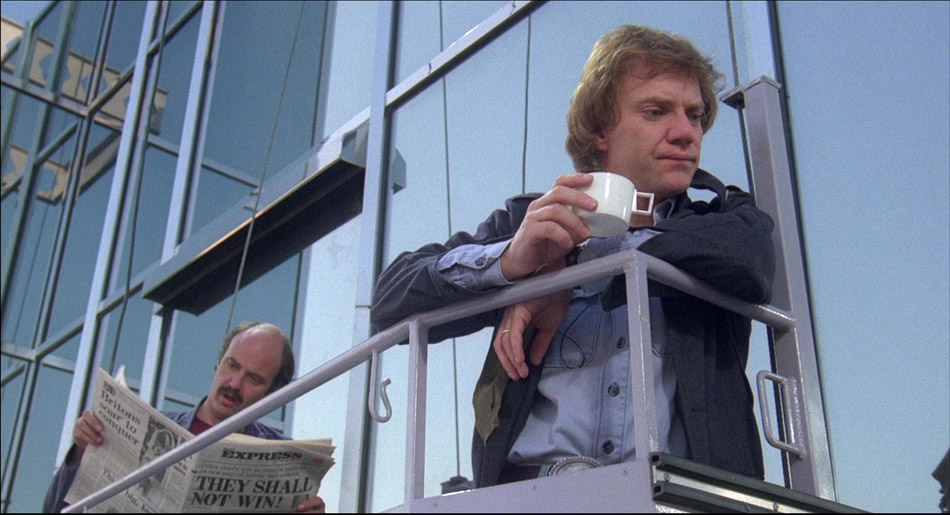
Apologies, went off piste there. Britannia Hospital is the story of a hospital taking in a royal visitor while embroiled in industrial action and a protest against wealthy privilege. Hospital administrators are willing to do anything to facilitate the visit despite the kitchen staff being on strike, the wealthy patients being up in arms including an African king used to sedan chairs and a small media team trying to infiltrate the hospital’s modern wing which houses all sorts of unpleasantness. It is, in short, unlike that last sentence, a very strange film and often feels like two very strange films. The only link between the administrators battling to keep the hospital safe for the Queen Mother and Professor Millar’s ghastly projects involving body parts in the building next door is simple geography. They are neighbours. Lindsay Anderson’s disdain for a certain type of Brit is on full display here. Everything a non-Brit fears about this once colonial giant is dialled up to eleven and it’s not an easy watch by any means. To make a comedy out of awful people doing dumb things to each other is possible. But sometimes people are so awful you just sit there, agape. The only warmth in the film is a fleeting sexual moment between a nurse and the reporter she smuggles into Professor Millar’s building. The tensions build and break out with a fair amount of police on protester violence (what goes around comes around) and a denouement in a literal theatre where the entire cast and demonstrators witness the birth of something that may, 38 years later, be closer (and less organic) than you think.
It’s hard to imagine If...., O Lucky Man! and Britannia Hospital as a legitimate trilogy. It’s not exactly three parts of the same story. But some characters are scattered throughout all three films, most notably Malcolm McDowell’s Mick Travis. He’s no machine-gun toting, rebellious schoolboy nor a wide-eyed innocent hawking coffee in this one. Here he’s an investigative reporter with an electronic camera device nicked from the scene of Dr. Floyd’s presentation in the space station in 2001: A Space Odyssey. He’s about the only sympathetic character together with the nurse played by Marsha Hunt, desperate to uncover morbid practises and immoral outrages in Professor Millar’s lab. Leading the pack of reprobates (it’s a big pack) is an actor whose voice and demeanour mark him out for playing ‘king’ roles. Graham Crowden is well loved by us at Outsider as Dr. Jock McCannon, the irascible alcoholic campus doctor from Andrew Davies’ brilliant anti-Thatcher comedy-drama A Very Peculiar Practice in 1986 and 1988. His monstrous Professor Millar is a staggeringly brilliant scientist with the ethics of a bullet. In one of his first scenes he demonstrates what he’s able to do with his power by grabbing fellow doctor, played by Jill Bennet, and kissing her hard. There’s no affection or warmth. It’s Leo DiCaprio in The Wolf of Wall Street, copping multiple feels from compliant women numbed by the wealth and power he has accrued. Jill Bennet sells the kiss but you can’t help but feel she’s responding to the power not the man. Another frequent collaborator, composer Alan Price seems to have adapted very recognisable and easy to parody tunes that make most Brits less nostalgic and more embarrassed. Rule Britannia, indeed with savage irony dripping as God Save The Queen plays over violent police brutality.
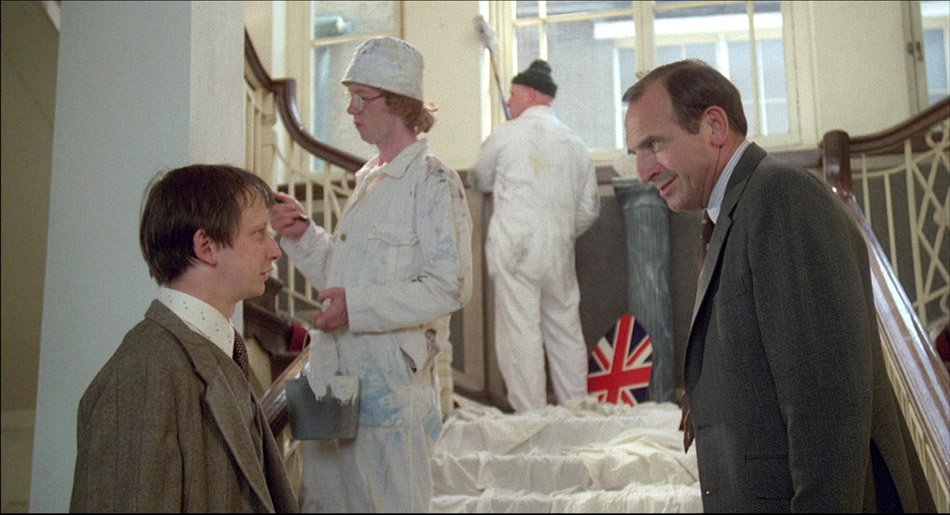
There’s a whole host of British talent on display here but none with characters you can really get behind. There’s Leonard Rossiter’s Potter, the chief administrator whose devious mind finds solutions to problems including those that require braining someone with a shovel. His hapless sidekick Biles (what kind of a character is named ‘Biles’?) always seems to be dressed in clothes a size too big for him or was that just the day’s fashion? Brian Pettifer seems to be enjoying his role (see his Extra Biles Apart later). Playing doomed cameos are two players from Anderson’s large acting troupe, Alan Bates and Arthur Lowe. Bates’ body parts are being eyed almost lustily by Professor Millar and in a side ward, Lowe expires after a short recitation of the Sceptred Isle speech from Richard II. Sadly the beloved actor was to die shortly after filming. Two characters intrigued me and given the world we live in today, they are characters that still intrigue but in extremely carefully worded ways. So to the following questions, I would presume the answers to both to be “Why not?” And risking incurring social justice wrath, I will ask them. Why was the man from the palace played by a little person (the preferred nomenclature I’m told)? And why was Lady Felicity played by a man dressed as a staid, middle class woman? Why not indeed? But was there significance or subtext to be gleaned in casting the diminutive Marcus Powell as Sir Anthony Mount? When you are small of stature, your acting parts are sadly all too predictable but I have to say as Horseflesh in Time Bandits, he was terrific. And what were we to make of John Bett playing Lady Felicity? Is this just Anderson screwing around with convention the way he brought dead people back to life and other eccentric oddities dotted throughout his films? I have to say, Gladys Crosbie plays a very believable Queen Mother.
If you are of a certain age, you will probably recognise a huge percentage of faces in this film even if you can’t place their names. It was Robbie Coltrane’s first feature (he’s on the picket line at the start) and another Harry Potter alumnus, Richard Griffith (Uncle Monty no less) is the hospital DJ. In a practically non-speaking part in the kitchens we find John Gordon-Sinclair, so charming a few years earlier playing Gregory in Gregory’s Girl. Have a guess at the name of his character? His only line comes directly before another, the latter of which would constitute jail time these days. No, I’m not going to repeat it here. I’m in enough trouble mentioning little people and cross-dressing as it is. Robin Askwith, another Anderson regular, gets his teeth into the union leader Keating joining Joan Plowright’s Grimshaw standing firm until one of them is offered a personal bung to go easy while HRH is in the building. Perhaps the most WTF casting is the young man playing Red, the totally irresponsible media tech guy who gets high as a kite while McDowell is risking his life to get incriminating footage. Hullo Luke Skywalker himself, Mark Hamill. Both McDowell and Hamill offered their services for free, expenses only. I always get a warm glow when I hear facts like that. It also says something about Anderson’s stature with actors.
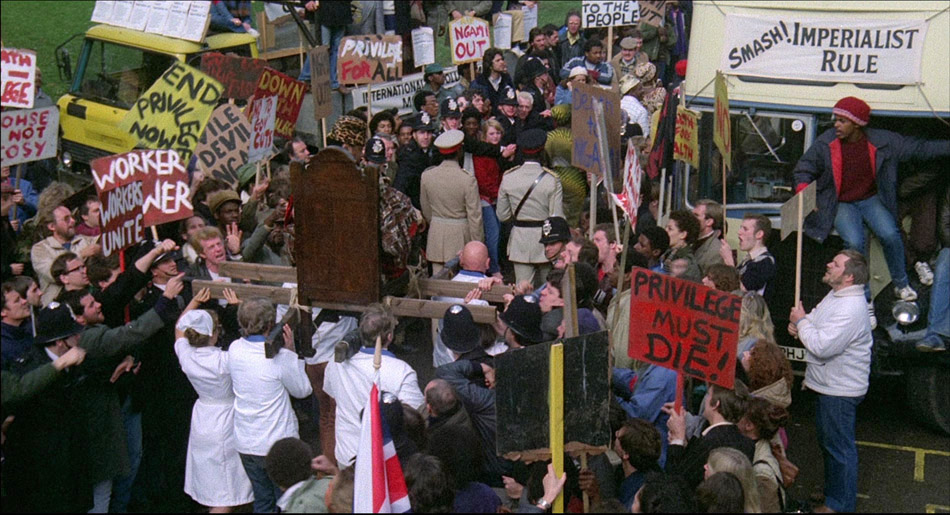
There’s no doubt that Britannia Hospital is not Star Wars. No film is ever guaranteed failure though most are but even the might of British acting talent couldn’t inhabit and enliven a script so laden with cynicism and hugely unlikeable characters. It has a perverse attraction to me in as much as I have now revisited it three times at three distinct periods in my life. It has managed to maintain its strange appeal despite it going out of its way to present truly petty and dire people. It’s a singular work, no question and no other film I know of is anything like Britannia Hospital. I’ll end with a quote from Anderson that is even more relevant in our age of peak sensitivity, outrage and offence presented as arguments to condemn people and things and the strange disappearance of truth and facts from our public discourse…
“The absurdities of human behaviour as we move into the twenty-first century are too extreme – and too dangerous – to permit us the luxury of sentimentalism or tears. But by looking at humanity objectively and without indulgence, we may hope to save it.”
Presented in the 1.85:1 aspect ratio, Britannia Hospital looks terrific. It is virtually dust and damage free and as lit by director of photography Mike Fash, the colours and shadows and contrast are all very naturalistic. Only in the bowels of Professor Millar’s lab are the sterile and luminescent Matrix greens to the fore.
The mono sound is well recorded, mixed and presented. There is not a single unintelligible line in the film except perhaps for Gregory’s outburst in the kitchens.
There are new and improved English subtitles for the deaf and hard-of-hearing.
The BEHP Interview with Lindsay Anderson (1991): archival audio recording, made as part of the British Entertainment History Project, featuring the celebrated director in conversation with Alan Lawson and Norman Swallow (1 hour 56’ 15”)
Edited (one presumes) to fit the feature’s running length, this is a fascinating extra with Anderson if full flow. He not only looks like an Oxford don, but he sounds like one with that perfect diction. He takes us through his career in film starting with writing for Sequence magazine in the 50s. His first foray in film was a documentary that he did almost everything on, something the unions at the time were not that keen on. In one instance they allowed him to stay in the cutting room as long as he didn’t actually touch the film… Right. Interesting to hear the adjective Anderson used to describe TV critic Barry Norman… ‘frightful’. He talks about the paltry release of If.... and his observation that the UK had ‘created a public that likes American pictures,” very telling. His for money project Wham! In China didn’t exactly foster a great relationship with George Michael. He observed that “Britain was on the way down and nothing can halt it!”, a sweeping statement that may still be true today.
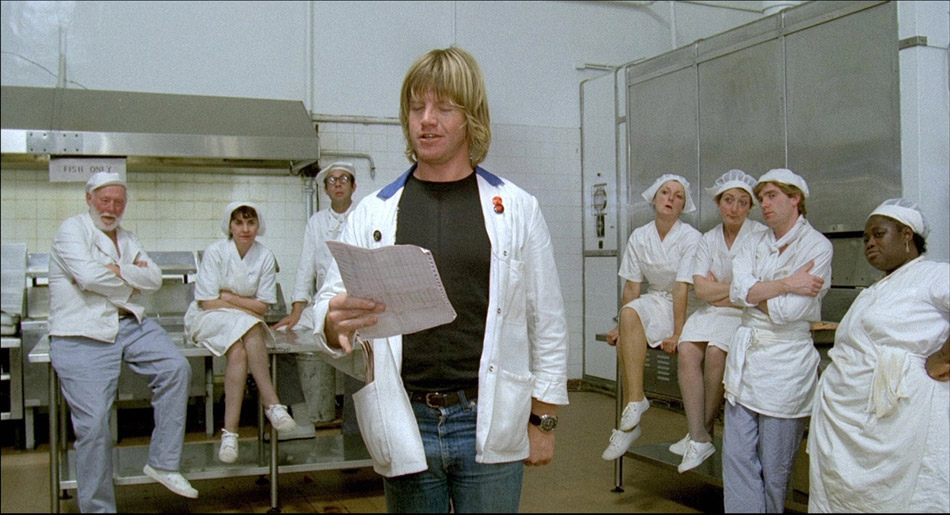
Healthy Reputation (2020): actor Robin Askwith fondly reflects on his films and friendship with Anderson (19’ 00”)
For my considerable sins, I always saw Robin Askwith as a cockier (no pun intended) version of his Confessions of a (…fill in the trade) character, Timothy Lea. I was surprised to learn he was a bona fide public schoolboy and had ambitions to be a Shakespearean actor. It doesn’t surprise me that he was a precocious young actor, not one bit. Askwith did me a huge favour. He shattered all my preconceptions about him and that is a positive thing. He is also the coolest looking 69 year-old I think I may have ever seen. He muses on a common trait he shared with Malcolm McDowell, his expressive features that had to be dialled down for the camera. Lindsay Anderson kept in periodic touch with Askwith, something he acknowledges as valuable to him so much so that he turned down a lucrative job to do Britannia Hospital after Anderson said “Do you shop at Harrods or Woolworths?” Good directing is casting, Anderson taught him and after seeing pantomime as Brechtian (I’ll leave conclusions on this remark to German drama scholars), he leaves us with the fact that he misses Anderson’s singular take on things.
Biles Apart (2020): actor Brian Pettifer recalls his close working relationship with Anderson (8’ 27”)
Pettifer, now a grand older man rather than the 1982 boy buffered by bad suits and over confident management reflects on how he got the part, playing against his colleague Leonard Rossiter and of course his dealings with director Anderson. He highlights something I’m ashamed to say I didn’t catch, a bit of subtext that stayed underneath me. If…. may make people remember another work of art with the same name, the poem by Rudyard Kipling that is surprisingly moving. Of course, the poem’s first line is “If you can keep your head while all around you are losing theirs…” I’ll say no more.
A Cut Above (2020): editor Michael Ellis discusses the film’s production (11’ 01”)
Ellis recounts how as a young editor he was given a voice in the room, so rare these and any days. Performing lower duties on the previous two of the trilogy, Ellis bagged the key job in post on Britannia Hospital. He notes how Anderson’s theatrical reputation was assured and how the esteemed director ignored notes from the producers (just as it should be. Those starting out in the business, if you ever want to work again, perhaps that’s not exactly sound advice…) Ellis reiterates Francis Ford Coppola’s idea that editing should not be lumped under the term post-production. It is such a vital part in the filmmaking process it should be renamed ‘production’. Hear, hear!
Original theatrical trailer (02’ 55”)
“Whatever is happening in Britannia Hospital?” asks a very familiar narrator’s voice. This long trailer takes us all the way through the movie and includes some racially unsavoury language. It also ‘spoils’ Mick Travis’ fate somewhat but then if you haven’t actually seen the film, it can hardly be regarded as one. I have to say you find Alan Bates having his (spoiler) cut off in too many trailers (all done in the best possible taste).
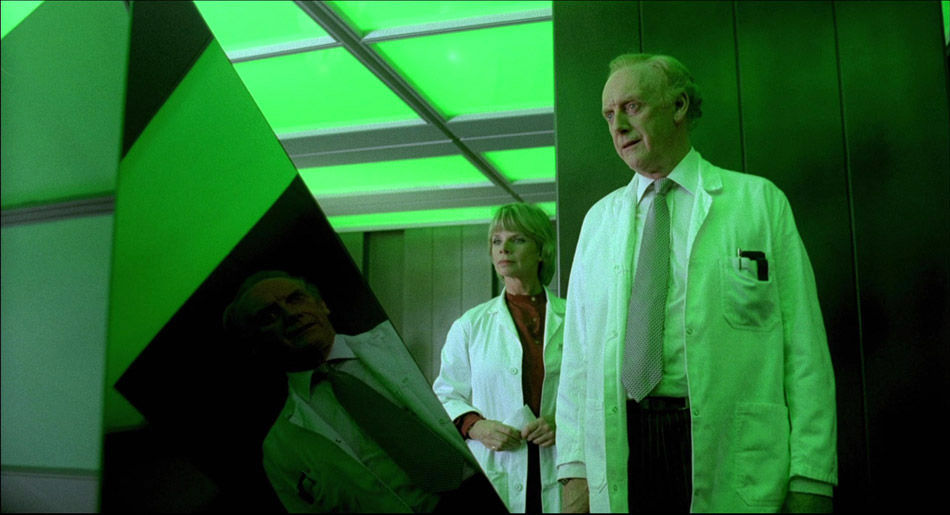
Original teaser trailer (01’ 40”)
Curious. I was expecting a 30” barrage of edits. I had to double check but after the minute mark I was convinced I was simply seeing part of the film itself. The protest gets ugly as those inside the hospital change their plans sharpish. I can’t imagine when in the publicity campaign this was used but you certainly get a flavour of the whole.
Image gallery: publicity and promotional material
Here we have 15 colour production stills, 3 black and white front-of-house stills, 5 pages of the EMI press release, multi-language press notes and five poster designs. Guess which nationality’s poster is the most striking. And why is this always the case?
Limited edition exclusive 40-page booklet with a new essay by Peter Cowie, an archival interview with Lindsay Anderson, extracts from the diaries of Anderson and screenwriter David Sherwin recounting the production, an overview of contemporary critical responses, and film credits
Cowie’s essay charts the genesis and production of the film paying specific attention to the political landscape it was born in. I learned a lot from his insights. Anderson’s stage work is alas lost to posterity and lives on in selected memories but you can’t help agreeing with Cowie’s assessment that Anderson was “…one of the finest stage directors of the twentieth century.” The short extract from a Cineaste interview with the director is lively and entertaining. “Revolution is the opium of the intellectuals,” indeed… The Making of Britannia Hospital features extracts from both writer Sherwin’s efforts of a ‘Making of…’ book and Anderson’s diaries. The result is a hugely candid and entertaining article that seems to pitch the two men against each other. The travails of an early screening are excruciating to read (I kept imagining being Anderson and how awful he must have felt). Critical Response is not exactly surprising, as all three reviewers have Anderson in their sights…
Cinema doesn’t get any stranger or bleaker than Britannia Hospital. Britain and the Health Service (doing such an extraordinary job these days, our first and best defence against the Corona virus) are fiercely lampooned but almost too earnestly for belly laughs. That being the case, Anderson’s polemic voice cuts through the detail and William Shakespeare provides some significant quotations in David Sherwin’s merciless screenplay. Complete the trilogy if you loved If…. and O Lucky Man! but be prepared for something quite different.
* https://www.theguardian.com/film/2004/sep/03/2
|